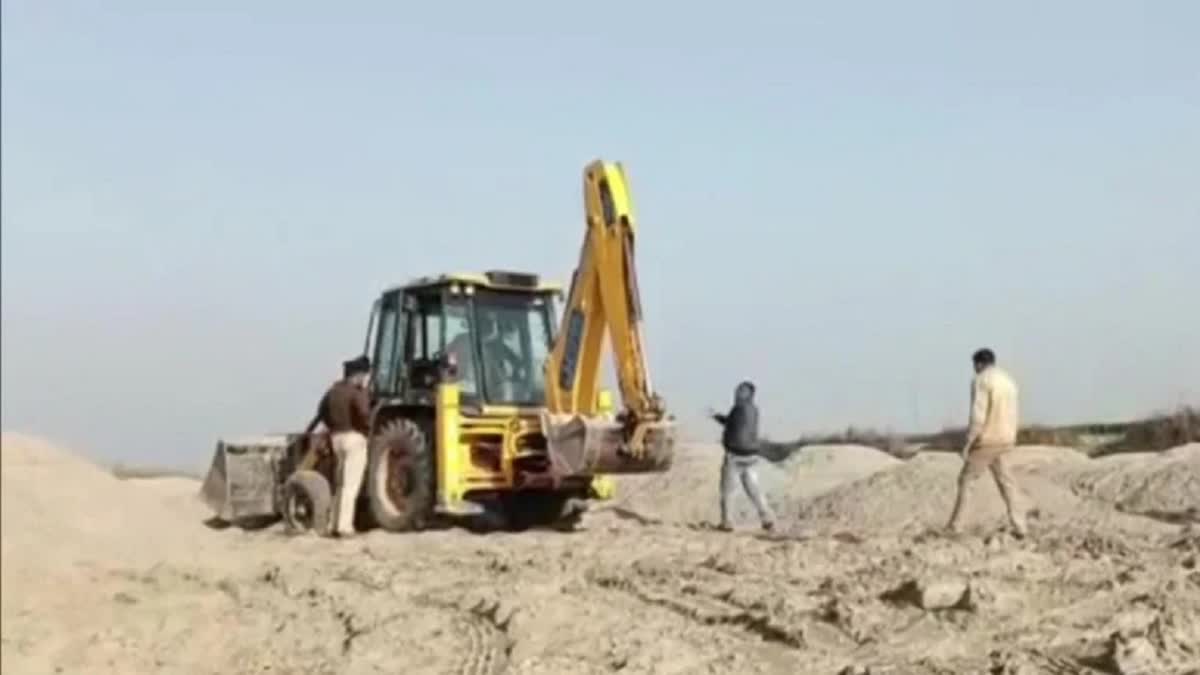Srinagar: The Jammu and Kashmir government's revenue from the mining of riverbeds and streams has shown a sharp increase, but it has come at the cost of the environment and water bodies.
The government in 2021 began auctioning off mining blocks in local streams and rivers when the mining was opened for non-local contractors. A total of 213 mining blocks were auctioned and then leased out to dozens of contractors, both locals and non-locals.
Officials said that 70 blocks in Kashmir in its different streams and nallas were auctioned while the rest, 143, were leased out in Jammu province. “These blocks have been leased for mining through e-auction in 2021. In the valley, the revenue earned by the government through auction, royalty, and fine is Rs 167 crores,” officials sources told ETV Bharat.
The revenue realised in 2022-23 is Rs 51,45,69,837; in 2023-24, Rs 67,57,59,011; and in 2024-25, up to December, Rs 49 crore, sources said. In 2020-21, the revenue from mineral mining was Rs 63 crore only, while it jumped to Rs 231 crore in 2022-2023 for JK after the auction exercise began.
In Kashmir, the 70 blocks were auctioned in eight districts except Srinagar and Bandipora. The highest number of blocks, 20, were leased out in Shopian, followed by 19 in Kulgam, 13 in Kupwara, six in Baramulla, four in Pulwama, three each in Budgam and Anantnag, and two in Ganderbal.
In the Jammu province, excluding Ramban, the other nine districts have seen massive mining as 143 blocks have been leased to contractors, both locals and non-residents.
The highest number of blocks auctioned is 31 in Jammu district, 25 in Reasi, 22 in Rajouri, 21 in Kathua, 19 in Samba, 15 in Poonch, six in Udhampur, and two each in Doda and Kishtwar.
The e-auction and lease of mining blocks in rivers and streams began after the abrogation of the article on August 5, 2019. The geology and mining department began the exercise when Jammu and Kashmir was under a prolonged internet ban, which deprived many local contractors of participating in the auctions.
Before the auction exercise was opened to outsiders, the extraction was done locally and manually by local people without using machinery, and the mining department would collect royalties from the extractors.
In the last four years, activists and locals have complained that the mining has led to environmental disasters as the water level in streams has decreased, impacting fish, aquatic life, and agriculture. In many areas, the level of streams that feed agriculture and horticulture land has gone further down than the farms and deviated the course of water and thus hit farming.
Officials admitted the rampant mining by the contractors is impacting the ecology of the streams, and contractors are violating J&K Minor Mineral Concession Rules 2016 and guidelines of J&K Environmental Impact Assessment Authority guidelines, environmental laws, and the Consent to Operate (CTO).
“The contractors carry out mining beyond the permissible limit and CTO and use heavy machinery for the extraction of boulders and gravel. The government must stop this auction and leasing of the mining of the riverbed on the scale it has done; the previous practice, which was in vogue before in the erstwhile state, must be restored,” an official of the mining department told ETV Bharat but wished not to be named.
As per Section 53 of the EIA or Environment Clearance, mining shall be done manually and minimally supported by semi-mechanised methods. “Heavy machinery like JCBS excavators, L&T hydraulic excavators, etc. should not be allowed. Emphasis should be given to the employment of a locally available labour force to address the socio-economic concerns of the locals,” it says.
Social activist Raja Muzaffar Bhat, who knocked on the doors of the National Green Tribunal (NGT) to stop this mining, said he wrote many complaints to district magistrates and the chief secretary of Jammu and Kashmir about the damage caused by the mining, but they showed no interest in curbing it.
Streams like Romshii, Rambiara, and Sasara in Pulwama and Shopian districts, Sukhnag in Budgam, and Ferozpor Nallah in Baramulla have seen rampant mining on a large scale that has destroyed their ecology, he told ETV Bharat.
Bhat was successful in banning the mining of two blocks in the Rambiara and Romshii streams when the NGT asked the district magistrate of Pulwama to impose a ban after the contractors violated the mining guidelines by using heavy machinery. The district administration of Shopian has also imposed a ban on “illegal” mining in the Rambiara stream. But Bhat says this does not stop the contractors who have got leases to stop mining.
“The government must impose a complete ban on mining by lease and use of heavy machines like L&T hydraulic excavators and JCBs,” he said.
After the elected government, the deputy chief minister, Surinder Kumar Choudhary, who holds the portfolio of the mining department, held several meetings with the mining department officials and chief secretary, directing them to curb rampant mining to save water bodies.
While Choudhary could not be contacted, ETV Bharat learnt from sources close to the deputy CM that he has shown no interest in leasing out the streams for mining but reviving the old practice of extraction by locals, manually. “The government will find a legal way to cancel the auctions. And until a conclusive, legal way out is found, the district administrators and police have been given clear directions to curb the rampage by the mining,” sources told ETV Bharat.
Read More



